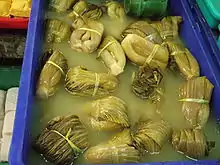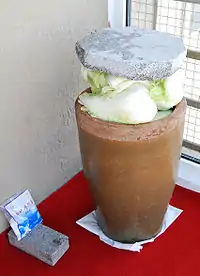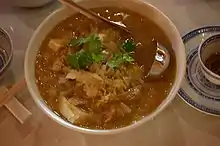Suan cai
Suancai (also called suan tsai and Chinese sauerkraut; lit. 'sour vegetable') is a traditional Chinese pickled Chinese cabbage (napa cabbage) or Chinese mustard, used for a variety of purposes. Suancai is a unique form of paocai, due to the ingredients used and the method of production.
| Suan cai | |||||||||||||||||||
|---|---|---|---|---|---|---|---|---|---|---|---|---|---|---|---|---|---|---|---|
 A tub of suancai made from Chinese mustard. | |||||||||||||||||||
| Chinese | 酸菜 | ||||||||||||||||||
| Hanyu Pinyin | suān cài | ||||||||||||||||||
| Literal meaning | Sour vegetable | ||||||||||||||||||
| |||||||||||||||||||
| Alternative Chinese name | |||||||||||||||||||
| Chinese | 鹹菜 | ||||||||||||||||||
| Literal meaning | Salted vegetable | ||||||||||||||||||
| |||||||||||||||||||
Production

Two distinct types of suancai are found in China:
- Northern China has used Napa cabbage (Chinese: 大白菜; pinyin: dà bái cài) as the traditional vegetable of choice.
- Southern and Western China uses the thick stalk varieties of Chinese mustard (Chinese: 芥菜; pinyin: jìe cai; Jyutping: syun1 coi3) variety to make suancai.
Production of suancai differs from other paocai in that the vegetable is compressed. This is accomplished by placing a heavy weight such as a large rock on top of the cover of the container so that the Chinese cabbage inside the container is slowly pressed as fermentation takes place. The processing of the vegetable helps to create a distinct flavor.
Suancai is often used in cooking with meat, especially pork. It is said to neutralize the grease of meat.
Regional
Muslim regions in mainland China and Taiwan
| Part of a series of articles on |
| Chinese Islamic cuisine |
|---|
 |
| Dishes |
In Chinese Islamic cuisine, suancai can top off noodle soups, especially beef noodle soup.
Hunan
In Hunan, suancai is frequently made with ginger and chilies (typical of Hunan cuisine).
Guangdong and Hong Kong
In Cantonese cuisine, it is served in a small dish, often as an appetizer, and usually free. Sometimes it can be available in mini-containers on the dining table. There are also Cantonese variations such as salted suancai (鹹酸菜).
Northeast China

In Northeastern Chinese cuisine, suancai is made from napa cabbage or head cabbage and has a taste similar to sauerkraut. As part of the cuisine in Manchuria, it is used with dumplings and boiled, or stir fried. More frequently, suancai is used to make suancai and pork stew.
Hot pot
In hot pot cuisine, it is often one of the ingredients.
Sichuan
In Sichuan cuisine, the dish suancai yu (sauerkraut with fish) uses suancai. This dish is served in a broth.
In Thailand

Suancai has also been incorporated into Thai cuisine, where it is known as phak kat dong (ผักกาดดอง) when only the upper stem and leaf are used'. Most often used in Thai-Chinese dishes, it can also be served as an ingredient in a Thai salad, or as a condiment such as with khao soi, a northern Thai curry-noodle soup. The chopped sour leaf and upper stem is combined with scrambled egg in the dish pak khat dong pat kai. When the dish includes only the main stem and tuber of the cabbage (in the style of zha cai), it is called chee chuan chai in Thai.
In Vietnam
Pickled cabbage or dưa cải chua is a traditional staple in northern Vietnamese cuisine. It is used in dishes such as canh cải chua (sour cabbage soup) or cơm rang dưa bò (fried rice with beef and pickles).
Comparison
Suancai is similar to a fermented-cabbage dish, sauerkraut, which is common in the cuisines of Central and Eastern Europe.
In popular culture
A popular sitcom and namesake song depicting lives in Northeast China, entitled "Cui Hua Shang Suancai" (翠花, 上酸菜, literally "Cui Hua, serve the suancai") debuted in 2001, and the phrase Cui Hua Shang Suancai became a popular catch phrase. Cui Hua became synonymous with a person from Northeast China. A company in China registered "Cui Hua" brand packaged suancai.[1]
Possible health hazards of pickled vegetables
The World Health Organization has listed pickled vegetables as a possible carcinogen, and the British Journal of Cancer released an online 2009 meta-analysis of research on pickles as increasing the risks of esophageal cancer. The report, citing limited data in a statistical meta analysis, indicates a potential two-fold increased risk of oesophageal cancer associated with Asian pickled vegetable consumption. Results from the research are described as having "high heterogeneity" and the study said that further well-designed prospective studies were warranted.[2] However, their results stated "The majority of subgroup analyses showed a statistically significant association between consuming pickled vegetables and Oesophageal Squamous Cell Carcinoma".[2]
The 2009 meta-analysis reported heavy infestation of pickled vegetables with fungi. Some common fungi can facilitate the formation of N-nitroso compounds, which are strong oesophageal carcinogens in several animal models.[3] Roussin red methyl ester,[4] a non-alkylating nitroso compound with tumour-promoting effect in vitro, was identified in pickles from Linxian in much higher concentrations than in samples from low-incidence areas. Fumonisin mycotoxins have been shown to cause liver and kidney tumours in rodents.[2]
A 2017 study in Chinese Journal of Cancer has linked salted vegetables (common among Chinese cuisine) to a 4-fold increase in nasopharynx cancer, where fermentation was a critical step in creating nitrosamines, which some are confirmed carcinogens, as well as activation of Epstein–Barr virus by fermentation products.[5][6]
See also
- Sauerkraut
- Zha cai – Pickled mustard plant stem from Chongqing, China
- Tianjin preserved vegetable – A type of pickled Chinese cabbage originating in Tianjin, China
- Meigan cai – A type of dry pickled Chinese mustard
- List of cabbage dishes – Wikipedia list article
References
- http://ent.sina.com.cn/cuih.html
- Islami, F (2009). "Pickled vegetables and the risk of oesophageal cancer: a meta-analysis". British Journal of Cancer. 101 (9): 1641–1647. doi:10.1038/sj.bjc.6605372. PMC 2778505. PMID 19862003.
- Li, MH; Ji, C; Cheng, SJ (1986). "Occurrence of nitroso compounds in fungi‐contaminated foods: A review". Nutrition and Cancer. 8 (1): 63–69. doi:10.1080/01635588609513877. PMID 3520493.
- Liu, J. G.; Li, M. H. (1989). "Roussin red methyl ester, a tumor promoter isolated from pickled vegetables". Carcinogenesis. 10 (3): 617–620. doi:10.1093/carcin/10.3.617. PMID 2494003.
- "Study: Salted vegetables increase risk of nose cancer". 16 January 2017. Retrieved 15 February 2018.
- "Health". Retrieved 15 February 2018.